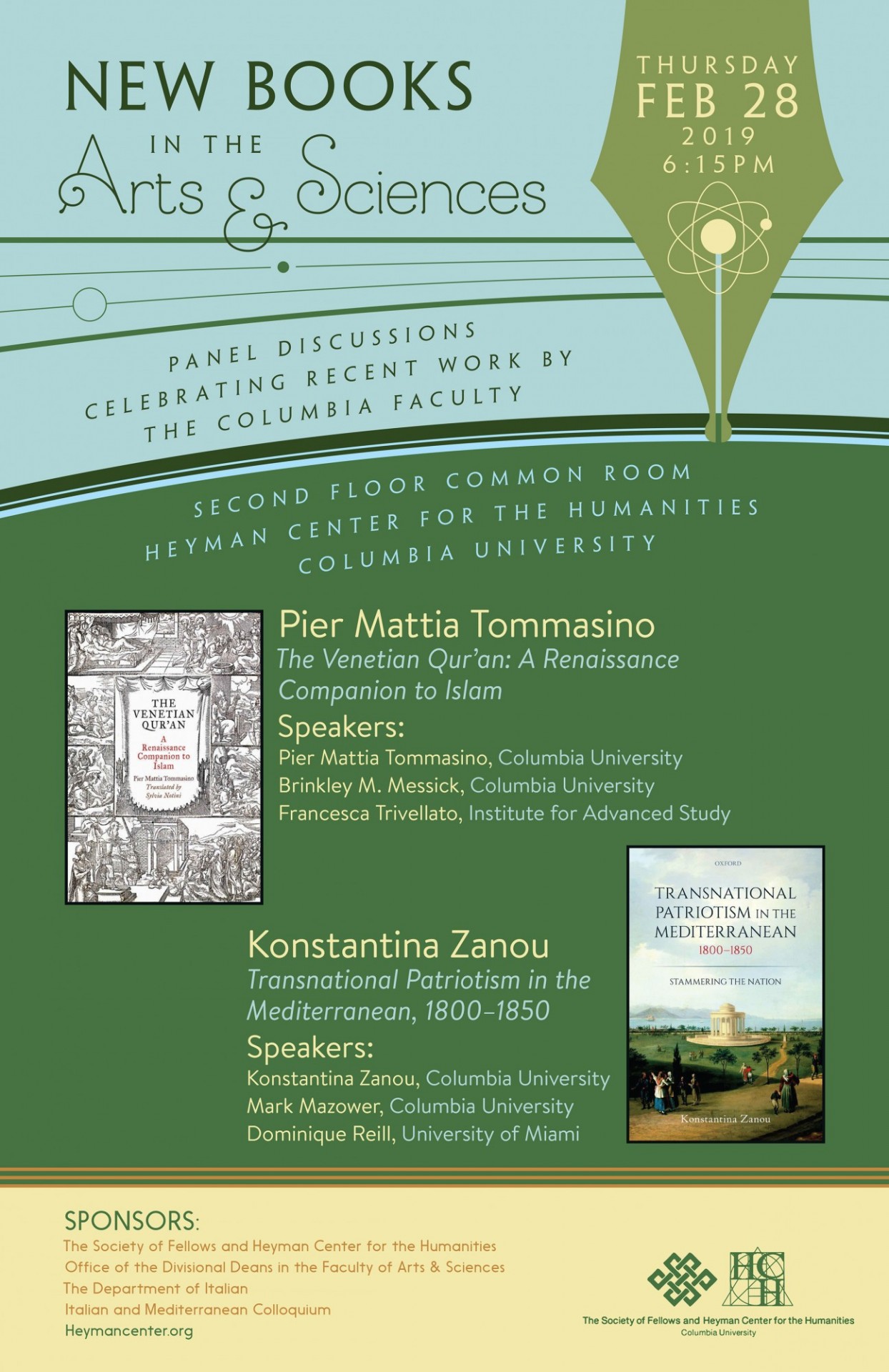This event is free and open to the public - No registration necessary: first come, first seated.
Participants
-
Author
Pier Mattia Tommasino
Assistant Professor of Italian
Columbia University
-
Author
Konstantina Zanou
Assistant Professor of Italian
Columbia University
-
Speaker
Elizabeth Leake
Professor of Italian
Columbia University
-
Speaker
Brinkley M. Messick
Professor, Anthropology and The Department of Middle Eastern, South Asian, and African Studies
Columbia University
-
Speaker
Mark Mazower
Chair
Heyman Center for the Humanities
Columbia University
-
Speaker
Francesca Trivellato
Professor, Early Modern History
Institute of Advanced Study
-
Speaker
Dominique Reill
Associate Professor, History
University of Miami
The Venetian Qur'an: A Renaissance Companion to Islam
By: Pier Mattia Tommasino
An anonymous book appeared in Venice in 1547 titled L'Alcorano di Macometto, and, according to the title page, it contained "the doctrine, life, customs, and laws [of Mohammed] . . . newly translated from Arabic into the Italian language." Were this true, L'Alcorano di Macometto would have been the first printed direct translation of the Qur'an in a European vernacular language. The truth, however, was otherwise. As soon became clear, the Qur'anic sections of the book—about half the volume—were in fact translations of a twelfth-century Latin translation that had appeared in print in Basel in 1543. The other half included commentary that balanced anti-Islamic rhetoric with new interpretations of Muhammad's life and political role in pre-Islamic Arabia. Despite having been discredited almost immediately, the Alcorano was affordable, accessible, and widely distributed.
In The Venetian Qur'an, Pier Mattia Tommasino uncovers the volume's mysterious origins, its previously unidentified author, and its broad, lasting influence. L'Alcorano di Macometto, Tommasino argues, served a dual purpose: it was a book for European refugees looking to relocate in the Ottoman Empire, as well as a general Renaissance reader's guide to Islamic history and stories. The book's translation and commentary were prepared by an unknown young scholar, Giovanni Battista Castrodardo, a complex and intellectually accomplished man, whose commentary in L'Alcorano di Macometto bridges Muhammad's biography and the text of the Qur'an with Machiavelli's The Prince and Dante's Divine Comedy. In the years following the publication of L'Alcorano di Macometto, the book was dismissed by Arabists and banned by the Catholic Church. It was also, however, translated into German, Hebrew, and Spanish and read by an extended lineage of missionaries, rabbis, renegades, and iconoclasts, including such figures as the miller Menocchio, Joseph Justus Scaliger, and Montesquieu. Through meticulous research and literary analysis, The Venetian Qur'an reveals the history and legacy of a fascinating historical and scholarly document.
Transnational Patriotism in the Mediterranean, 1800-1850
By: Konstantina Zanou
Transnational Patriotism in the Mediterranean investigates the long process of transition from a world of empires to a world of nation-states by narrating the biographies of a group of people who were born within empires but came of age surrounded by the emerging vocabulary of nationalism, much of which they themselves created.
It is the story of a generation of intellectuals and political thinkers from the Ionian Islands who experienced the collapse of the Republic of Venice and the dissolution of the common cultural and political space of the Adriatic, and who contributed to the creation of Italian and Greek nationalisms. By uncovering this forgotten intellectual universe, Transnational Patriotism in the Mediterranean retrieves a world characterized by multiple cultural, intellectual, and political affiliations that have since been buried by the conventional narrative of the formation of nation-states.
Transnational Patriotism in the Mediterranean rethinks the origins of Italian and Greek nationalisms and states, highlighting the intellectual connection between the Italian peninsula, Greece, and Russia, and reestablishing the lost link between the changing geopolitical contexts of western Europe, the Mediterranean, and the Balkans in the Age of Revolutions. It re-inscribes important intellectuals and political figures, considered "national fathers" of Italy and Greece (such as Ugo Foscolo, Dionysios Solomos, Ioannis Kapodistrias and Niccolò Tommaseo), into their regional and multicultural context, and shows how nations emerged from an intermingling, rather than a clash, of ideas concerning empire and liberalism, Enlightenment and religion, revolution and conservatism, and East and West.
This event is sponsored by The Society of Fellows and Heyman Center for the Humanities, Office of the Divisional Deans in the Faculty of Arts and Sciences, The Department of Italian, and The Italian and Mediterranean Colloquium.
